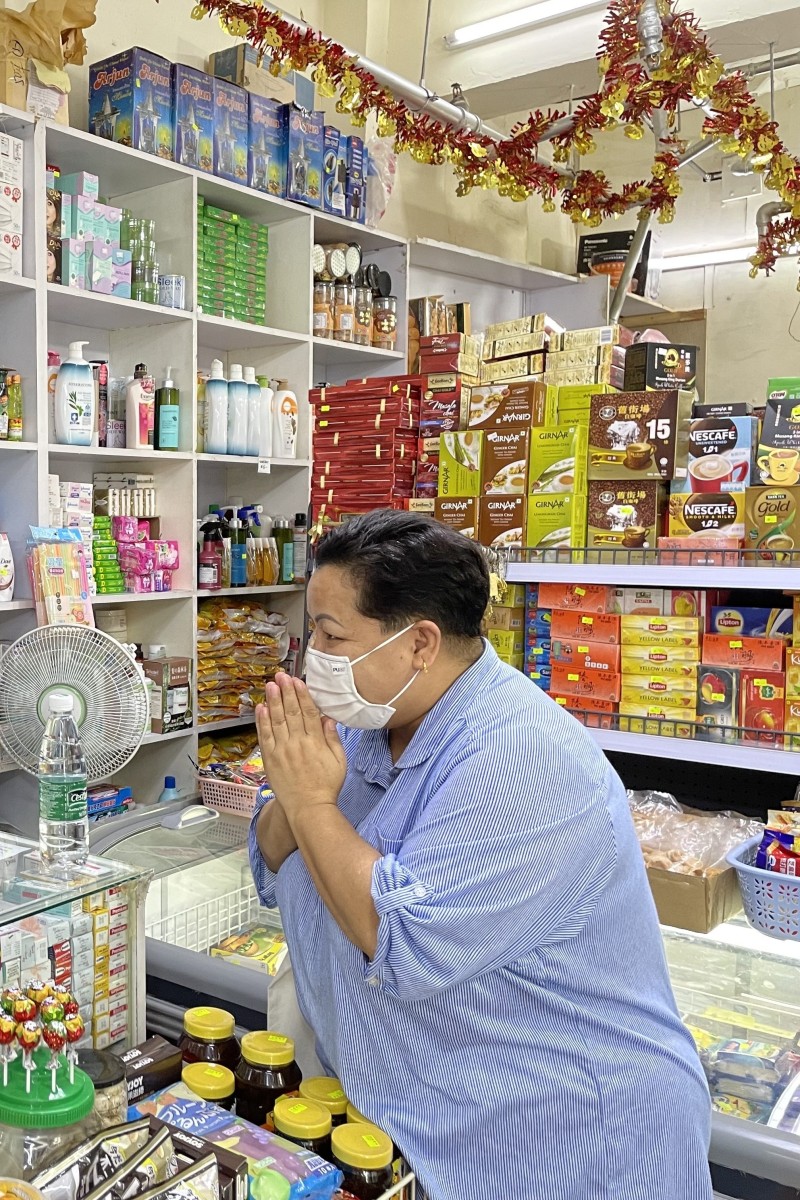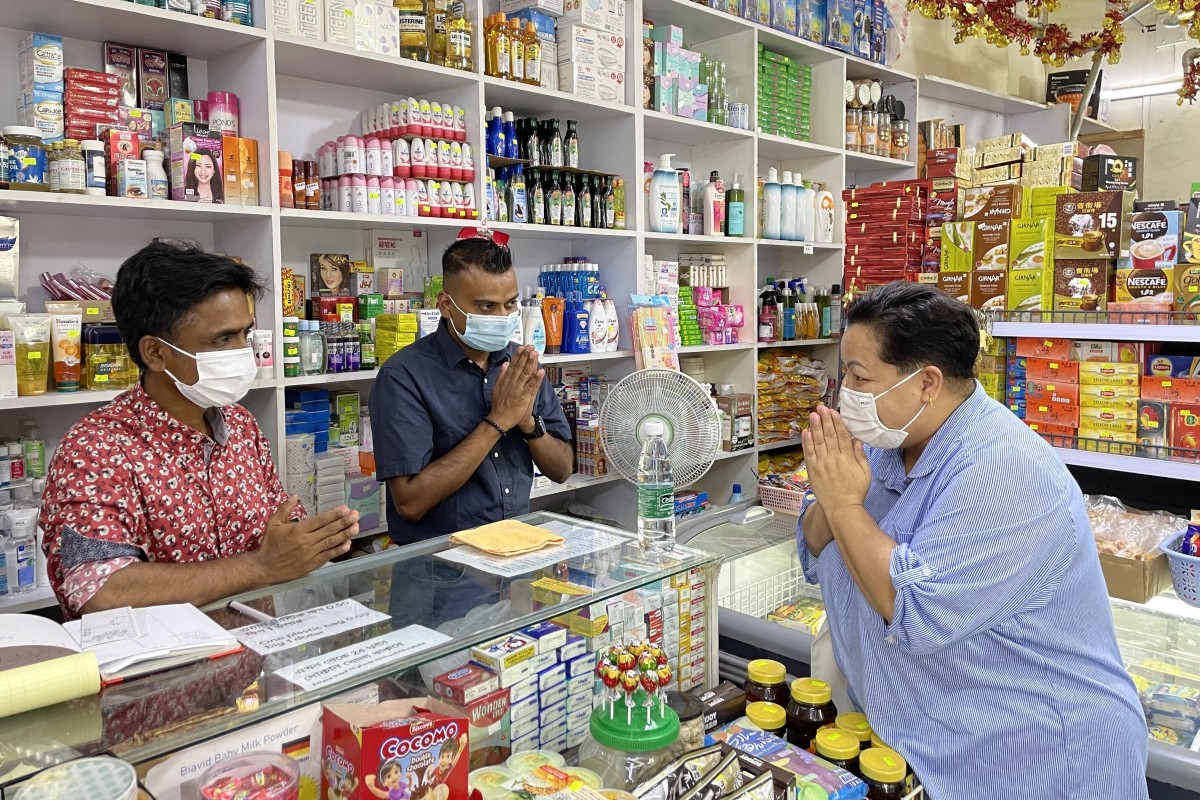
‘This is our home’: ethnic minority residents of Jordan’s Man Wah Sun Chuen estate may lose community to redevelopment
- Community coordinator Judy Gurung, who has lived in the housing estate for more than a decade, shares about the multi-ethnic neighbourhood’s bonds
- Urban Renewal Authority has proposed turning the buildings into ‘comprehensive mixed-use development’, though the scheme has not been finalised
 The owner of Jordan Mart in Man Wah Sun Chuen, Aftab Manik (left) greets community coordinator Judy Gurung (right) at his shop on Man Wai Street. Photo: Yanni Chow
The owner of Jordan Mart in Man Wah Sun Chuen, Aftab Manik (left) greets community coordinator Judy Gurung (right) at his shop on Man Wai Street. Photo: Yanni ChowSitting quietly next to West Kowloon’s luxury properties and modern infrastructure is a half-century-old housing estate called Man Wah Sun Chuen.
The peculiarly shaped buildings with their upper storeys converging towards the centre like two staircases have been Judy Gurung’s home for more than 10 years.
“When you see [them] from far away, the building is like this right?” asked the 47-year-old Nepalese woman, as she pressed her hands together.
“We give the name of this area ‘namaste building’,” she said, explaining how the buildings’ distinctive structure resembled the conventional Hindu greeting.
Built between the 1960s and 1970s, the eight blocks anchored on the edge of Jordan have seen many changes.
Building community
Gurung still remembers what the neighbourhood was like when she first moved there nearly a decade ago. The facilities were underdeveloped, and public transport was scarce, but it was a quiet residential area.
“[Back then] the local people can’t describe who is the Nepalese, who is the Filipino, who is the Indian and who is the Pakistani,” she recalled.
Now, Gurung said Man Wah Sun Chuen’s affordable rent and convenient location had attracted about 2,500 people from ethnic minority groups.
Website preserves one of Hong Kong’s oldest public housing estates
Fluent in English, Cantonese and Nepalese, Gurung has been working as a community coordinator in the district, bridging the gap between the local Chinese and ethnic minorities and helping to translate day-to-day interactions.
“They’d come to me for everything. When they argue with the house owner, they call me. They call me when they call the police. Even at the Chinese medical shop, they’d call me,” she said, adding she helped low-income families navigate government policies and subsidies.
When there is major news about the neighbourhood or crucial government announcements, Gurung disperses information in English and Nepalese on social media.
Co-founder’s life inspired website helping Hong Kong ethnic minorities
“What benefits me every night after I help people and come back to my home – even though I have a small, small room in a subdivided flat – [is that] I’m still very happy,” she shared.
Over time, she and other residents from ethnic minority groups have established an inclusive and amiable place while befriending local Chinese tenants as well.
“The laundry [shop] lady is also a very close friend now ... Sometimes, when people donate new clothes, she’d say ‘this is for Judy’,” the community coordinator said, smiling as she talked about her bond with her neighbours.
Proposals for redevelopment
Last year, the Urban Renewal Authority conducted a study mapping out a blueprint for planning, restructuring and regenerating old districts, such as the one that Man Wah Sun Chuen is in.
In an email response to Young Post, the authority shared that its proposals included “large-scale restructuring by integrating Man Wah Sun Chuen with nearby roads and open spaces where a larger development site is formed to create regeneration and development opportunities for such a strategic location”.
With developments in recent years, the area has become a sought-after site where three railways converge.
The authorities suggested turning the private housing cluster with about 3,200 flats into a “comprehensive mixed-use development with offices, retail, hotel, arts and cultural uses as well as residential components”, making the area more lucrative for developers.
While the scheme has not been finalised, and no timetable has been confirmed, the news alarmed the building’s residents, especially the ethnic minority community that has worked hard to create a base there.
“When I received this information and shared with them [neighbours from ethnic minority groups], many of their faces are worried and not sure what to do,” Gurung said.
Won’t be easy to start over
After living in the area for more than six years, Amrit*, 48, started his own business selling daily necessities at Man Wah Sun Chuen last year.
“This is our home,” said the Nepalese man, adding he would be sad if he and his family of five were forced to leave the neighbourhood.
“We lived here for six, seven years ... We have some attachment, you know? We know people here, and we’re friends with them. Of course, we’re going to miss it.”
“When you go to a new place ... of course, it’s hard to get used to ... [a] new environment, new people, new friends. You have to start from the beginning – doesn’t matter whether you like it in the future or not,” he stressed.
Podcast hosts on how growing up as Indians in Hong Kong shapes their content
Aftab Manik, a 40-year-old Bangladeshi man, has been living in the area since 2004 with his family, and he owns a shop in the estate selling imported groceries. He thinks the close-knit community there is irreplaceable.
“Everyone is accepting,” the shop owner shared, adding that his frequent clients included local Chinese residents.
Besides having his business there, Manik’s two children also study nearby, so he is worried about authorities’ potential redevelopment plans.
“The government should make a proper plan or give time or else it is not possible,” he emphasised.
Relocating to a new district and starting over is scary.
“It is very hard to get new customers. We know how to communicate with our people,” he shared, adding that a lot of ethnic minorities came to the area because they felt at home speaking their own language.
Gurung felt similarly: “I already built my identity here. I already built a very good relationship with all the Chinese and non-Chinese. And you know that relationships can’t be bought by money.”
“This society I really love; this place I really love. I can’t see that day when they kick us out,” she said emotionally. “I don’t want to move anywhere – this is my home.”
*Full name withheld at interviewee’s request
Peculiarly 古怪地
strange; queer; odd
Converging 交會
to tend to meet in a point or line; incline toward each other, as lines that are not parallel.
Resembled 看起來像
to be like or similar to.
Navigate 瀏覽
move around a website, the internet, etc.
Disperse 發放
to spread widely; disseminate.
Amiable 親切的
friendly; sociable.
Cluster (同類物聚集的)群
a number of things of the same kind, growing or held together; a bunch.
Lucrative 盈利的
profitable; money making; remunerative.
